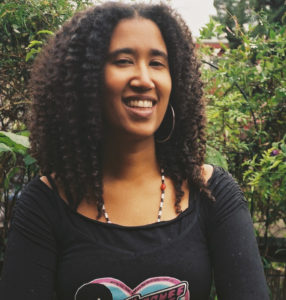Isolation, Community, and Trayvon Martin

 By Aya deLeon, Director of Poetry for the People, Department of African American Studies, UC Berkeley
By Aya deLeon, Director of Poetry for the People, Department of African American Studies, UC Berkeley
Growing up in the 70s, most adults I knew remembered exactly where they were when they heard that JFK or MLK were shot. In my life, I’ve never had one of those stories until now. I didn’t post on my usual Friday, because I was at a healing workshop for people of African heritage called “Black Liberation and Community Development.” I will always remember this as my location when I heard the verdict in the trial for the shooting death of Trayvon Martin.
The experience is memorable, not so much because the verdict was so different from Rodney King or Oscar Grant or Amadou Diallo or any of the other young African heritage men shot during my lifetime. But rather, the difference was the context of receiving yet another painful reminder that the justice system fails consistently in addressing deadly violence against young Black men by white authorities, even when they are not so white, and their authority is self-appointed.
On Saturday night, we went around in a circle and everyone just spoke about their thoughts and feelings hearing the verdict. Some were angry, some disappointed, some had never had any hope but it stung anyway. Some had suggestions for answers, some hoped that the shooter’s own guilt would end up being a form of punishment in itself.
As usual, I felt nothing. Just like I felt nothing when all of the other shootings happened, and when the verdicts got handed down. I have strong feelings about the issue of police brutality and racist violence of all types. I’ve demonstrated publicly against police brutality; one of the many novels I’m working on is about police brutality. So it’s not that I don’t care, it’s just that in big public incidents of violence, I have a complete emotional disconnect. If I see the incidents portrayed in mainstream news, I generally have a feeling of rage at the newscast, and what I perceive as biased reporting. In fact, those feelings are so strong, that I can’t really watch mainstream news. But I also recall listening to outraged commentary on alternative radio news, and still didn’t feel much. In the circle at the healing workshop, I looked at that numbness for the first time.
One explanation is that I’m always aware of racism and consistently tuned into the reality of racist violence, so it doesn’t elicit a strong emotional reaction. My mother was a civil rights attorney, and worked frequently on cases involving police brutality. I grew up hearing dinner conversation that included harrowing tales of brutality that her clients had survived. In the workshop, I wondered aloud whether this had sort of made me immune to the strong feelings because the low grade feelings were always present. Or perhaps I was just numb—too overwhelmed at an early age with the vastness of racism, and had shut down.
As I spoke aloud about it in a room full of black people, it became clear that it was numbness, because the shell cracked and I started to cry. It gives me a chance to notice that so much of the hard news we hear about the world assaults us as we are in transit, surrounded by strangers, or at work in offices where displays of emotion would be inappropriate. And yet many of us feel it. And we numb it out and keep going.
